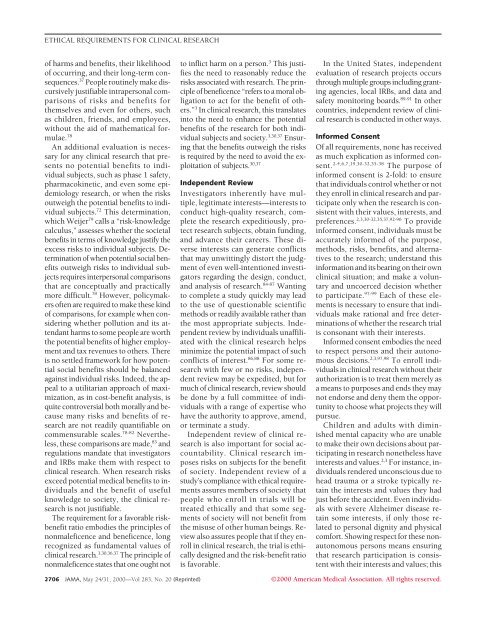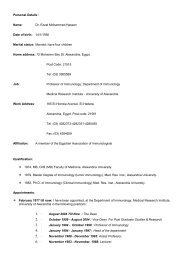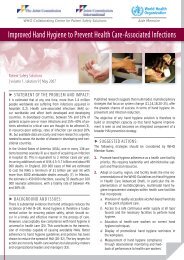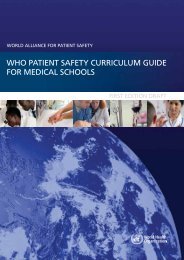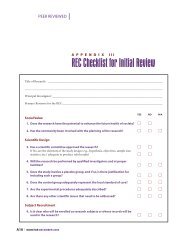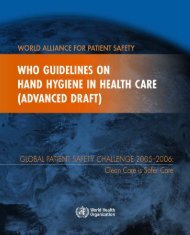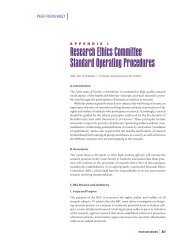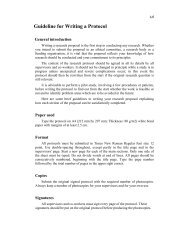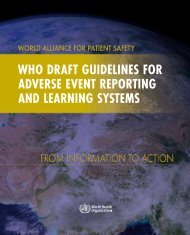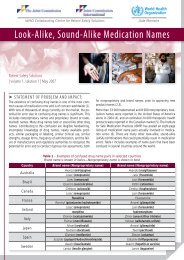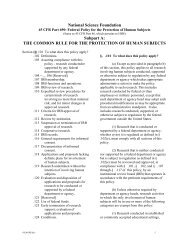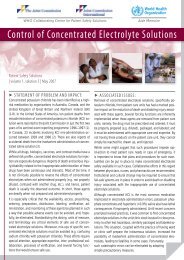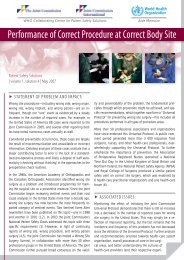What Makes Clinical Research Ethical? - Forum of Ethics Review ...
What Makes Clinical Research Ethical? - Forum of Ethics Review ...
What Makes Clinical Research Ethical? - Forum of Ethics Review ...
You also want an ePaper? Increase the reach of your titles
YUMPU automatically turns print PDFs into web optimized ePapers that Google loves.
ETHICAL REQUIREMENTS FOR CLINICAL RESEARCH<br />
<strong>of</strong> harms and benefits, their likelihood<br />
<strong>of</strong> occurring, and their long-term consequences.<br />
37 People routinely make discursively<br />
justifiable intrapersonal comparisons<br />
<strong>of</strong> risks and benefits for<br />
themselves and even for others, such<br />
as children, friends, and employees,<br />
without the aid <strong>of</strong> mathematical formulae.<br />
78<br />
An additional evaluation is necessary<br />
for any clinical research that presents<br />
no potential benefits to individual<br />
subjects, such as phase 1 safety,<br />
pharmacokinetic, and even some epidemiology<br />
research, or when the risks<br />
outweigh the potential benefits to individual<br />
subjects. 72 This determination,<br />
which Weijer 79 calls a “risk-knowledge<br />
calculus,” assesses whether the societal<br />
benefits in terms <strong>of</strong> knowledge justify the<br />
excess risks to individual subjects. Determination<br />
<strong>of</strong> when potential social benefits<br />
outweigh risks to individual subjects<br />
requires interpersonal comparisons<br />
that are conceptually and practically<br />
more difficult. 78 However, policymakers<br />
<strong>of</strong>ten are required to make these kind<br />
<strong>of</strong> comparisons, for example when considering<br />
whether pollution and its attendant<br />
harms to some people are worth<br />
the potential benefits <strong>of</strong> higher employment<br />
and tax revenues to others. There<br />
is no settled framework for how potential<br />
social benefits should be balanced<br />
against individual risks. Indeed, the appeal<br />
to a utilitarian approach <strong>of</strong> maximization,<br />
as in cost-benefit analysis, is<br />
quite controversial both morally and because<br />
many risks and benefits <strong>of</strong> research<br />
are not readily quantifiable on<br />
commensurable scales. 78-82 Nevertheless,<br />
these comparisons are made, 83 and<br />
regulations mandate that investigators<br />
and IRBs make them with respect to<br />
clinical research. When research risks<br />
exceed potential medical benefits to individuals<br />
and the benefit <strong>of</strong> useful<br />
knowledge to society, the clinical research<br />
is not justifiable.<br />
The requirement for a favorable riskbenefit<br />
ratio embodies the principles <strong>of</strong><br />
nonmaleficence and beneficence, long<br />
recognized as fundamental values <strong>of</strong><br />
clinical research. 3,30,36,37 The principle <strong>of</strong><br />
nonmaleficence states that one ought not<br />
to inflict harm on a person. 3 This justifies<br />
the need to reasonably reduce the<br />
risks associated with research. The principle<br />
<strong>of</strong> beneficence “refers to a moral obligation<br />
to act for the benefit <strong>of</strong> others.”<br />
3 In clinical research, this translates<br />
into the need to enhance the potential<br />
benefits <strong>of</strong> the research for both individual<br />
subjects and society. 3,30,37 Ensuring<br />
that the benefits outweigh the risks<br />
is required by the need to avoid the exploitation<br />
<strong>of</strong> subjects. 30,37<br />
Independent <strong>Review</strong><br />
Investigators inherently have multiple,<br />
legitimate interests—interests to<br />
conduct high-quality research, complete<br />
the research expeditiously, protect<br />
research subjects, obtain funding,<br />
and advance their careers. These diverse<br />
interests can generate conflicts<br />
that may unwittingly distort the judgment<br />
<strong>of</strong> even well-intentioned investigators<br />
regarding the design, conduct,<br />
and analysis <strong>of</strong> research. 84-87 Wanting<br />
to complete a study quickly may lead<br />
to the use <strong>of</strong> questionable scientific<br />
methods or readily available rather than<br />
the most appropriate subjects. Independent<br />
review by individuals unaffiliated<br />
with the clinical research helps<br />
minimize the potential impact <strong>of</strong> such<br />
conflicts <strong>of</strong> interest. 86,88 For some research<br />
with few or no risks, independent<br />
review may be expedited, but for<br />
much <strong>of</strong> clinical research, review should<br />
be done by a full committee <strong>of</strong> individuals<br />
with a range <strong>of</strong> expertise who<br />
have the authority to approve, amend,<br />
or terminate a study.<br />
Independent review <strong>of</strong> clinical research<br />
is also important for social accountability.<br />
<strong>Clinical</strong> research imposes<br />
risks on subjects for the benefit<br />
<strong>of</strong> society. Independent review <strong>of</strong> a<br />
study’s compliance with ethical requirements<br />
assures members <strong>of</strong> society that<br />
people who enroll in trials will be<br />
treated ethically and that some segments<br />
<strong>of</strong> society will not benefit from<br />
the misuse <strong>of</strong> other human beings. <strong>Review</strong><br />
also assures people that if they enroll<br />
in clinical research, the trial is ethically<br />
designed and the risk-benefit ratio<br />
is favorable.<br />
In the United States, independent<br />
evaluation <strong>of</strong> research projects occurs<br />
through multiple groups including granting<br />
agencies, local IRBs, and data and<br />
safety monitoring boards. 89-91 In other<br />
countries, independent review <strong>of</strong> clinical<br />
research is conducted in other ways.<br />
Informed Consent<br />
Of all requirements, none has received<br />
as much explication as informed consent.<br />
2-4,6,7,19,30-32,35-38 The purpose <strong>of</strong><br />
informed consent is 2-fold: to ensure<br />
that individuals control whether or not<br />
they enroll in clinical research and participate<br />
only when the research is consistent<br />
with their values, interests, and<br />
preferences. 2,3,30-32,35,37,92-96 To provide<br />
informed consent, individuals must be<br />
accurately informed <strong>of</strong> the purpose,<br />
methods, risks, benefits, and alternatives<br />
to the research; understand this<br />
information and its bearing on their own<br />
clinical situation; and make a voluntary<br />
and uncoerced decision whether<br />
to participate. 97-99 Each <strong>of</strong> these elements<br />
is necessary to ensure that individuals<br />
make rational and free determinations<br />
<strong>of</strong> whether the research trial<br />
is consonant with their interests.<br />
Informed consent embodies the need<br />
to respect persons and their autonomous<br />
decisions. 2,3,97,98 To enroll individuals<br />
in clinical research without their<br />
authorization is to treat them merely as<br />
a means to purposes and ends they may<br />
not endorse and deny them the opportunity<br />
to choose what projects they will<br />
pursue.<br />
Children and adults with diminished<br />
mental capacity who are unable<br />
to make their own decisions about participating<br />
in research nonetheless have<br />
interests and values. 2,3 For instance, individuals<br />
rendered unconscious due to<br />
head trauma or a stroke typically retain<br />
the interests and values they had<br />
just before the accident. Even individuals<br />
with severe Alzheimer disease retain<br />
some interests, if only those related<br />
to personal dignity and physical<br />
comfort. Showing respect for these nonautonomous<br />
persons means ensuring<br />
that research participation is consistent<br />
with their interests and values; this<br />
2706 JAMA, May 24/31, 2000—Vol 283, No. 20 (Reprinted) ©2000 American Medical Association. All rights reserved.


